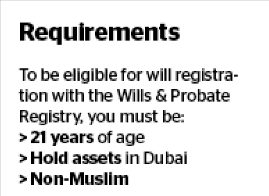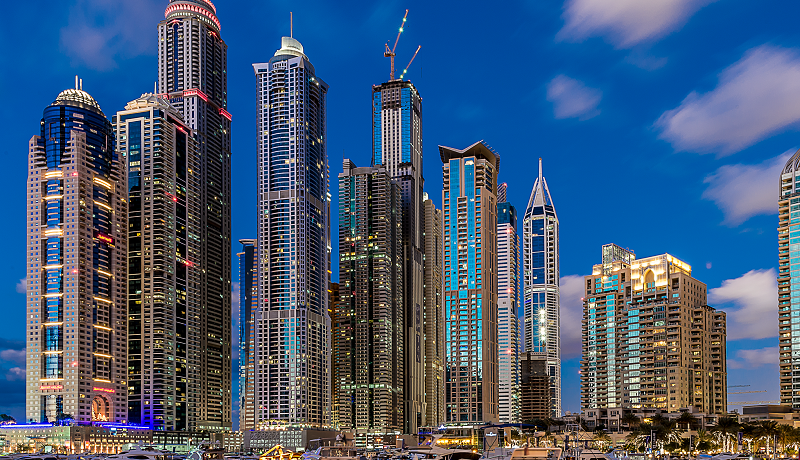The Wills & Probate Registry will offer legislative clarity over your Dubai-based assets
If you are a non-Muslim property investor in Dubai, you should consider registering a will with the Wills & Probate Registry, established under the jurisdiction of the DIFC Courts. It offers legislative certainty that your Dubai-based assets will be distributed as per your wishes in the unfortunate event of your death.
In the absence of one such will, the assets of non-Muslim residents and non-residents will be distributed to pre-determined relatives as per Shariah law. The Registry is the first jurisdiction in the Mena where you can register an English language will.
The entity was launched in May 2015 and has since registered around 1,500 wills.
“Typically, we register about 30 wills a week. In terms of demographic, it is approximately 30 per cent Indians, 30 per cent British, 20 per cent European and 10 per cent other nationalities. Men account for 55 per cent of wills registered while women make up 45 per cent. The majority of wills registered are mirror wills. We have a very wide age group of will registrants, the youngest being 23 and the oldest 94,” said Sean Hird, director of the Wills & Probate Registry.
The wills can include any moveable and immovable property. Wills also allow for provisions regarding guardianship. If individuals have children under the age of 21 and resident in Dubai, they may want to include guardianship provisions in the will. For others with a lot of property, wealth and business in Dubai, protecting those assets is the key driver behind registering a will.
Joint ownership
Quite often, couples jointly own property in Dubai. Under Dubai law, the property is considered to be in 50:50 shares. “In the UK and other jurisdictions, property is jointly held and thereby, if one of the partner passes away, it automatically transfers to the remaining partner. In Dubai, that’s not the case. If the husband passes away, the remaining 50 per cent share does not automatically pass on to the wife. Thereby, you use a will to say that I leave my share of the property to my wife. In case you have large families and have not registered a will with us, it increases the potential for relatives to come forward with claims on your estate and that can result in lengthy delays,” cautioned Hird.

The cost to register a single will at the Registry is Dh10,000 and that of two mirror wills is Dh15,000. To amend wills at a later date, the cost is Dh550. If you only wish to determine guardianship for family members under 21, the fee is Dh5,000 and Dh7,500 for single and mirror wills respectively.
The Registry has tied up with banks, including Emirates NBD, National Bank of Abu Dhabi, Citibank, RAKBANK, HSBC and Abu Dhabi Commercial Bank, to offer easy payment plans to customers over 12 months. The offers have been designed to spread the costs of registering a will.
So, what is the process to register a will? Choose from a list of registered legal practitioners on the Registry’s website and get your will drafted. The Registry does not offer legal advice.
One may draft a will themselves but it is recommended that you seek the advice of a legal practitioner who is registered as wills draftsmen as it is crucial that such an important legal document should include all the essential details that apply to your individual situation.
Legal advice
“Lawyers will give advice on what is the best scheme of arrangement for an individual, taking into account personal circumstances, objectives, tax considerations, etc.,” explained Hird.
Once a will is drafted, take an appointment at the Registry. A draft of the will must sent to the Registry in advance to help identify any errors. On the date of appointment, the testator must come along with a witness, who is not a beneficiary or guardian in the will. A registration officer discusses the will with the testator to make sure that the person fully understands all provisions and gives them an opportunity to make any last-minute changes.

“About 10 to 15 per cent of wills are amended on the day of appointment. The appointment provides us an opportunity to assess whether a person’s understanding of the will is appropriate, whether s/he is under undue influence by someone else in the room, etc. Commonly asked questions include: what is the process for probate, what does an executioner do, what happens if someone comes forward with a claim on my estate, guardianship, etc.,” informed Hird.
The original registered will is stored electronically at the Registry while certified copies are given to the testator.
“The key driver for people coming to us is choice. Under our system, you can choose exactly where you want your property to go. Under Shariah law, the asset distribution is primarily to blood relatives. In terms of succession planning around your business, you may want to leave some property to your business partner in return for him/her accommodating your children’s interests. You must have freedom of choice to achieve those aims,” he added.
If someone challenges a will at the Registry, the issue will go to the DIFC Courts. The DIFC Courts issues the probate order that instructs third parties to transfer assets from the deceased to the nominated beneficiary.
All rights reserved to the initial publisher for khaleejtimes.com
Collected and published by Arms &McGregor International Realty® editorial team. Get in touched with us at [email protected]

